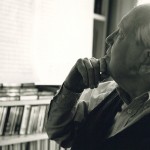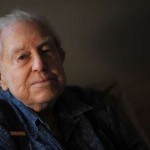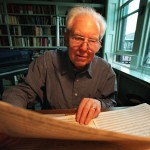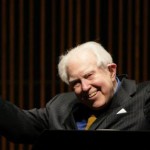 It’s no secret that most never make it to see the century mark of their birth. Legendary and iconic composer Elliott Carter made it notably past that mark. But, as many of you have certainly heard by now, he passed away exactly one week ago.
It’s no secret that most never make it to see the century mark of their birth. Legendary and iconic composer Elliott Carter made it notably past that mark. But, as many of you have certainly heard by now, he passed away exactly one week ago.
At the age of 103, Mr. Carter had lived a full life of influence, helping shape the musical trends of the 20th century in a unique way. Last December, a concert was held in Manhattan for what was to be the final celebration of his birthday while the composer himself was still alive… and present! True to form, this performance was not a tribute to works long since past but rather a presentation of fresh and new material from Mr. Carter. His musical output continued through the final years of his life.
As he approached his 100th birthday, composer Elliott Carter would lie in bed each morning and greet a flood of new musical ideas. He then worked diligently for most of the day, committing thoughts to paper and turning out finished works faster than their world premieres could be scheduled.
For a composer at the century mark to be so prolific, at such a high level, was a phenomenon possibly unique in the history of music. Meanwhile, the works he created seemed to take the diamond-hard, prismatic style of his mature music in directions that were lighter and more fanciful with each passing year.
Mr. Carter died Monday in his New York City home, said his longtime associate, clarinetist Virgil Blackwell. He was 103.
The most respected American composer of the late 20th century, Mr. Carter wrote 158 works and twice received the Pulitzer Prize for music. He was also the first composer to receive the National Medal of Arts.
“He was a remarkable man, we know that,” Blackwell said by phone from Manhattan Monday. “Music was the most important thing in his life. He put all of his energy into composing. And the number of pieces he was able to write in the last 10 years was absolutely astounding. They were all different; he didn’t repeat himself.”
Regarding the incredible longevity of his musical creativity, it is perhaps impossible to overstate its significance. This towering titan of the 20th century spent much of the final quarter of his life, which began long after many people retire, producing a considerable number of his most ambitious and greatest projects.
Mr. Carter was already in his 80s when he took on the most expansive work of his career, “Symphonia,” and he was 90 when he wrote his first opera, “What Next?” That opera was premiered in 1999, and the question in its title was repeatedly asked of the composer throughout the next decade, as he penned a seemingly endless stream of concertos, brief pieces for orchestra, instrumental chamber music, and vocal works. The scores from this so-called late-late period remained highly challenging, but also, in pieces like the Flute Concerto and the Clarinet Concerto, took on a newly Mozartean level of grace.
The 103-year birthday bash concert presented a number of his most recent compositions, including five pieces that Mr. Carter had composed that year and his song cycle A Sunbeam’s Architecture which he wrote at the age of 101 in 2010.
Throughout his career, Elliott Carter was seen as a staunchly complex modernist. Like many other composers of the modern era, his music often encountered difficulty being received and understood by the masses, with intricately developed works that often left musicians and experts as confused as the general public. However, some began to note a shift in the last couple decades of the composer’s music: more lyrical, more welcoming, and more accessible.
Elliott Carter’s “Boston Concerto” (Part One), composed in 2002
Whatever your opinion of his music, it is undeniable the impact that he had on contemporary classical music both in the “old post-war world” and in this new modern world of today. Daniel Barenboim has this to say about Elliott Carter:
For me, he was and remains one of the most interesting figures of music history in the past century.
The historical importance of a composer does not always go hand in hand with the quality of their work. To understand Carter, one must look at where he came from, and the way he reacted to what came before him.
Read the full article – Daniel Barenboim Remembers Elliott Carter
Also check out this piece from NPR, complete with audio – Always A Rose: Elliott Carter Remembered
Other stories from the classical music world:
- The Philharmonia Baroque Orchestra (PBO), led by Music Director Nicholas McGegan, recently gave a “historically-informed program of Beethoven.”
- Another update from our friends at Classical Revolution, now on the ground with a new chapter in Richmond, Virginia.
- Lots in the news lately about the orchestras in St. Louis… what about the classical radio station? Find out!
- This is a good follow-up story to the one we shared last week regarding the departure of conductor Michael Christie from the Colorado Music Festival, going more in-depth about the “magical legacy” that Christie leaves behind.
- Finally, in the wake of the new James Bond film Skyfall which recently premiered, famed musical comedy duo Igudesman & Joo pay tribute with a courageous mashup of Bond and Mozart.




















No comments yet.